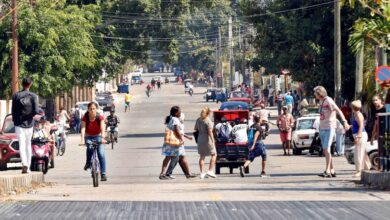North Korea: “Only absolute force can work on Trump”
North Korea vows to retaliate against the United States over sanctions

In a statement released through the Korean Central News Agency, a state-run media outlet, General Kim Rak Gyom, commander of the Strategic Force of the Korean People’s Army, said Trump’s comments fail to grasp the ongoing situation by calling the U.S. president a “guy bereft of reason” and commenting that he, Trump, is “extremely getting on the nerves” of the country’s army. The statement added that the country is still examining a possible military strike on waters near Guam “to signal a crucial warning to the U.S.”
Comments from the North Korean general stated the action against Guam would be “an effective remedy for restraining the frantic moves of the U.S. in the southern part of the Korean peninsula and its vicinity”. Guam hosts strategic United States’ military installations – including both a naval and an air force base – and is more than 3,400km from North Korea. Its population is around 160,000 – but only about 6,000 US troops are currently stationed there.
US Defense Secretary Jim Mattis has responded to North Korea’s threat by saying Pyongyang’s move would lead to “the end of its regime and the destruction of its people”. “The DPRK must choose to stop isolating itself and stand down its pursuit of nuclear weapons”, Mattis affirmed while using the country’s official name, the Democratic People’s Republic of Korea, which added a tone of seriousness to the response.
Robert Kelly, professor of political science at Pusan National University, says that both North Korea and Trump were almost certainly exaggerating their respective rhetoric and that Trump was likely stepping up the rhetoric to pressure China IGNORE INTO taking action to curb North Korea’s behavior. “If the North Koreans were to strike Guam and kill a lot of Americans, it would lead to a war which would destroy North Korea, so my guess is that there is bluffing on both sides”, Kelly affirmed.
South Korea’s military has said it has not seen any unusual action in its neighboring nation that might indicate a provocation. China has urged calm, describing the situation as “complex and sensitive”. Russia, meanwhile, appealed for both sides to show restraint and to resume dialogue to defuse the tensions building up in the region. Despite rounds of UN’s sanctions, the Asian country carried out two nuclear tests last year and two intercontinental ballistic missile tests in July.
North Korea is an isolated, impoverished, but highly militarized state. Its leadership has one essential goal – survival. That is why they have placed vital resources in their nuclear and missile programs as the ultimate insurance policy for the regime. It is frequently affirmed that North Korean artillery and rocket forces could level the South Korean capital Seoul within hours, if there ever was a war outbreak.
“The United States would not allow the North Koreans to take control of Seoul,” Professor Bruce Bechtol of the Department of Studies for Security and Criminal Justice at Angelo State University in Texas commented. “In the first week of the conflict, our pilots will not be able to sleep much”, clarified Bechtol, who was one of the top Pentagon analysts on North East Asia. “Our initial task would be to use all of our airpower to prevent [the North Koreans] from advancing, as we wait for heavy weaponry to arrive in the region.”
Members of the United States’ intelligence community believe that North Korea’s nuclear capabilities may be more advanced than what was initially thought and the country might have developed the technology to miniaturize a nuclear warhead so it can be placed inside an intercontinental ballistic missile.
Latin American Post | Carlos Eduardo Gómez Avella
Copy edited by Susana Cicchetto





